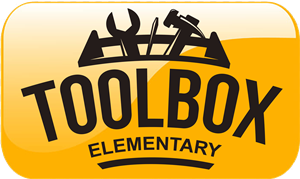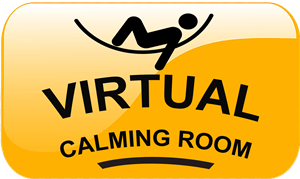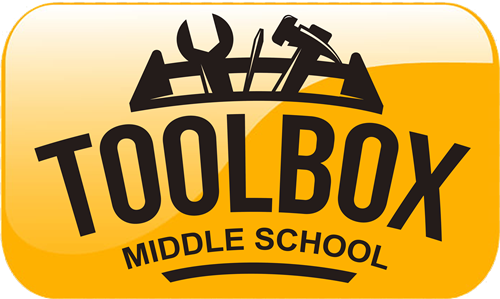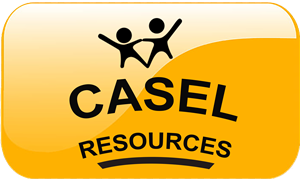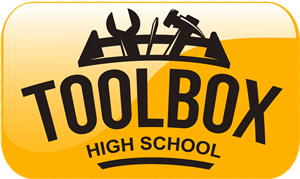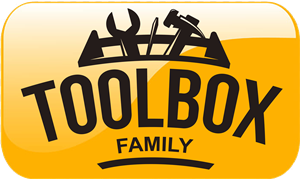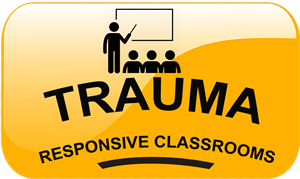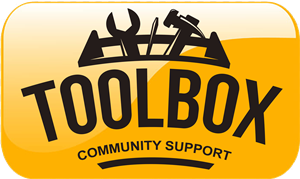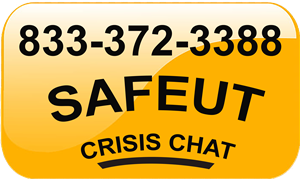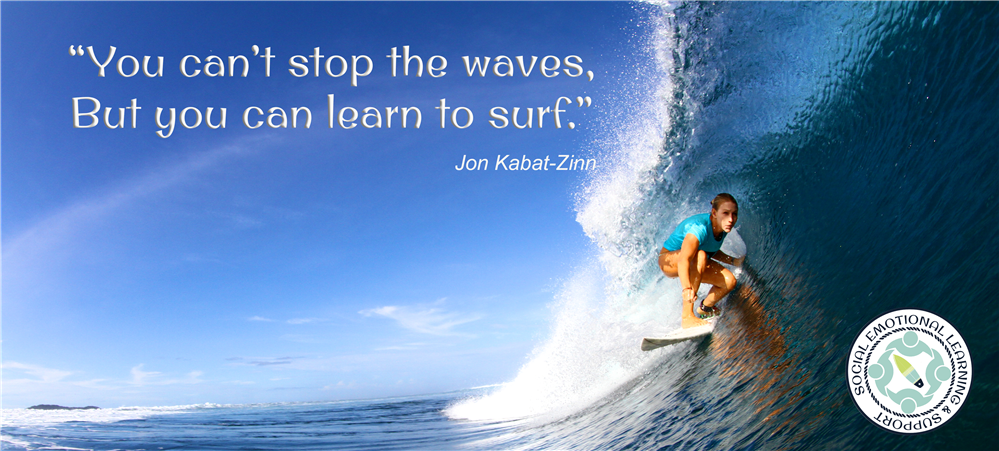
Social Emotional Learning and Support
-
Cache County School District Vision of SEL
In an effort to meet the needs of adults and children in the Cache County School District, we actively promote Social Emotional Learning to develop the skills, empathy, and resilience needed to care for oneself and others in order to make our school community a safe, caring and healthy place to live.
Statement on Social Emotional Learning and Support
It is apparent that the world has become much more complicated for our children. In our schools, we see every day the effects this has on our students as they struggle to navigate these complexities. Social emotional learning (SEL) and support provide students with skills to not only cope with daily struggles, but to thrive academically, socially, emotionally, and mentally. SEL provides a foundation for positive, long-term effects from effective problem-solving to self-discipline, from impulse control to emotion management and more. As a result, students, families, and schools thrive together.
Our district uses the following evidenced-based SEL resources: Learning to Breathe, Botvin Life Skills, Mind-Up, Pure Edge, and Sanford Harmony.
We have carefully reviewed each of these resources and feel confident they meet our high community standards, follow Utah's Portrait of a Graduate and most importantly, provide valuable skills to our students. We encourage teachers and families to use these resources to help students succeed in and out of the classroom. We acknowledge our success in helping students thrive requires the combined efforts of all stakeholders involved. To this end, we ask that you let us know if you find updated lessons or links that might violate our community standards so that they can be addressed expediently. Thank you.
Why SEL?
Social and emotional learning (SEL) is an integral part of education and human development. SEL is the process through which all young people and adults acquire and apply the knowledge, skills, and attitudes to develop healthy identities, manage emotions, achieve personal and collective goals, feel and show empathy for others, establish and maintain supportive relationships, and make responsible and caring decisions.
SEL advances educational equity and excellence through authentic school-family-community partnerships to establish learning environments and experiences that feature trusting and collaborative relationships, rigorous and meaningful curriculum and instruction, and ongoing evaluation. SEL can help empower young people and adults to co-create thriving schools and contribute to safe and healthy communities.
SOCIAL AND EMOTIONAL LEARNING (SEL) COMPETENCIES
SELF-AWARENESS
SOCIAL AWARENESS
RESPONSIBLE DECISION-MAKING
The ability to accurately recognize one’s own emotions, thoughts, and values and how they influence behavior. The ability to accurately assess one’s strengths and limitations, with a well-grounded sense of confidence, optimism, and a “growth mindset.”
The ability to take the perspective of, and empathize with others, including those from diverse backgrounds and cultures. The ability to understand social and ethical norms for behavior and to recognize daily, school, and community resources and supports.
The ability to make constructive choices about personal behavior and social interactions based on ethical standards, safety concerns, and social norms. The realistic evaluation of consequences of various actions, and a consideration of the well-being of oneself and others
➤ IDENTIFYING EMOTIONS
➤ ACCURATE SELF-PERCEPTION
➤ RECOGNIZING STRENGTHS
➤ SELF-CONFIDENCE
➤ SELF-EFFICACY
➤ PERSPECTIVE-TAKING
➤ EMPATHY
➤ APPRECIATING DIVERSITY
➤ RESPECT FOR OTHERS
➤ IDENTIFYING PROBLEMS
➤ ANALYZING SITUATIONS
➤ SOLVING PROBLEMS
➤ EVALUATING
➤ REFLECTING
➤ ETHICAL RESPONSIBILITY
SELF-MANAGEMENT
RELATIONSHIP SKILLS
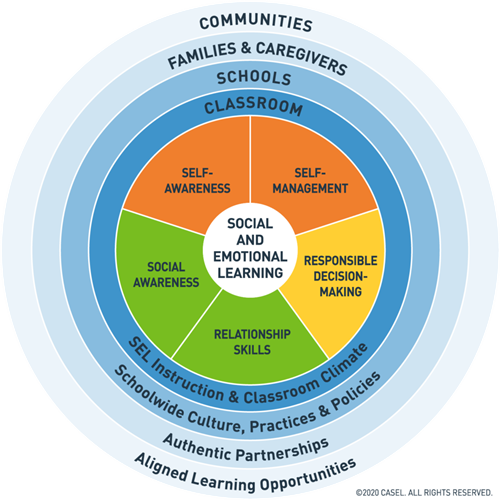
The ability to successfully regulate one’s emotions, thoughts, and behaviors in different situations--effectively managing stress, controlling impulses, and motivating oneself. The ability to set and work toward personal and academic goals.
The ability to establish and maintain healthy and rewarding relationships with diverse individuals and groups. The ability to communicate clearly, listen well, cooperate with others, resist inappropriate social pressure, negotiate conflict constructively, and seek and offer help when needed.
➤ IMPULSE CONTROL
➤ STRESS MANAGEMENT
➤ SELF-DISCIPLINE
➤ SELF-MOTIVATION
➤ GOAL SETTING
➤ ORGANIZATION SKILLS
➤ COMMUNICATION
➤ SOCIAL ENGAGEMENT
➤ RELATIONSHIP BUILDING
➤ TEAMWORK
COLLABORATIVE FOR ACADEMIC, SOCIAL, AND EMOTIONAL LEARNING www.casel.org
Schools: Effectively integrating SEL schoolwide involves ongoing planning, implementation, evaluation, and continuous improvement by all members of the school community. SEL efforts both contribute to and depend upon a school climate where all students and adults feel respected, supported and engaged.
Because the school setting includes many contexts—classrooms, hallways, cafeteria, playground, bus—fostering a healthy school climate and culture requires active engagement from all adults and students. A strong school culture is rooted in students’ sense of belonging, with evidence that suggests that it plays a crucial role in students’ engagement. SEL also offers an opportunity to enhance existing systems of student support by integrating SEL goals and practices with universal, targeted, and intensive academic and behavioral supports. By coordinating and building upon SEL practices and programs, schools can create an environment that infuses SEL into every part of students’ educational experience and promotes positive social, emotional, and academic outcomes for all students.


